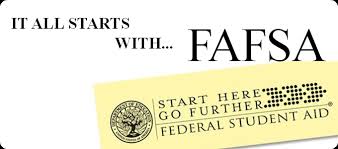Student Financial Aid FAQ

The holidays are over now, but that doesn't mean that stress levels are going to be going down anytime soon. Now begins the mad scramble for parents of High School seniors and college students alike. Financial aid season has begun. I'm going to be providing helpful tips answers to frequently asked question that many people have but tend to not ask until it's too late.
I know what you're thinking; What does she know about financial aid. As it happens, I'm coming up on my second year working at a call center that supports local colleges' financial aid offices. We get authorized access to their systems, and help field the calls that come in from students and parents alike. But I'm going to make this easy, and do the baby steps of the financial aid process, from application to documentation, to disbursement. Please be aware that different institutions have different standards for what they ask for as far as information goes. This is by no means a complete list, just most frequent documentation that gets requested for federal purposes.
The process of filing for financial aid, or FA as I'm going to refer to it or SFA which is Student Financial Aid, can be a hassle and I've taken many a phone call from students and parents because they missed something and it held up the process. So to save some hassles and headaches, let's get started.
-
FAFSA Application
Your first step for applying for financial aid for colleges is to go to the FAFSA or Free Application for Federal Student Aid website. Emphasis is on the FREE part. If you do a search because you don't have it saved and can't remember it, be careful of the one you enter. If the site asks for a fee, LEAVE IMMEDIATELY. That ISN'T the FAFSA site! The application never asks for payment of any kind. If it does, it's a SCAM.
Now I can't walk you step by step through each section, but I do have a few tips that will help you not glitch the system.
- APPLY EARLY. I don't mean a month before school starts. The earlier you apply, the easier it is and the more time to fix any hiccups that come up. Please consult the schools websites for the Priority Dates for applying for FAFSA. If you apply after the Priority Dates, it doesn't mean that you can't file for FA, only that you're further down the queue than you would like. FA is a first come, first served type of thing, do it early, don't procrastinate because it could cost you.
- If you are putting more than one school code because you or your child haven't decided on a school yet, that's okay for now. But once you have it narrowed down to one, remove the other school codes. It duplicates the information and sends it to the other schools that you put in a code for, which can trip some red flags in the system and slow down processing.
- Tax Information - If you haven't filed your taxes yet, but you don't want to wait to apply for FAFSA, you can use the previous year's tax information, but update it with the new tax information as soon as you know it is processed. You can pull your information using the Data Retrieval Tool, rather than having to do it by hand.
- Application Assistance - Contact the school that you plan on attending if you need assistance filling out the application, but please be advised that they won't be able to help over the phone. Check the school's website to see if they have a specific representative that assists with the application.
As a final note for this section, either before or concurrently or at least around the same time, apply to the school that you are trying to get financial aid from. In order to find the information in the system a student ID is required to be matched up to it. If there's no student information, then there is nothing to link the FAFSA information to, and it can't be found in the system.
-
Financial Aid Awards
For students or parents that equivocate between choosing one school or another because they want to see what they can get, I would advise against it. Financial aid awards are offered based off of the tax information that you provide to FAFSA, on top of what the school gets allotted for a budget that goes to financial aid. I don't say this to discourage anyone from applying for FA, however it is divvied out on a need-based, first come first serve. Lower income and/ or more dependents have a higher chance to receive aid based on how early they filed for aid. So if you are trying to decide which school, go with either the one that you best feel goes with the curriculum that you are interested in or you have scholarships for specific reasons.
- Scholarships
Scholarships fall under financial aid, but almost as a special category. There are coordinators for most schools responsible for answering questions about them and directing you to the ones that might be best suited to you, outside of ones awarded based on athletic or academic merit. Once a student has been awarded a scholarship, usually it has to be verified by the Business/Bursar's office to certify its legitimacy. After that, it will be split between the Fall and Spring semesters, unless your institution works in trimesters, then it will be split accordingly.
- Grants
Grants are the usual method of financial aid that most students see. They are awarded out of a budget designated both by federal and/or state government. They can fluctuate from one year to another, and are not guaranteed. If you got them one year, do not assume that you will get it the next year. Grants are funds that you don't pay back, unless you drop to many classes and/or fail classes.
- Loans
There are loans that are federally eligible when you submit your FAFSA. They are the Federal Subsidized and Unsubsidized Loans. The difference between the two is with the Sub Loan, the interest accumulated on the loan is taken care of by the federal government until after you graduate. This isn't so with the Unsubsidized Loan.
There is also The Parent/Direct Plus Loan for students that have dependent status that parents/ guardians can get for additional funds. These loans are the responsibility of the parents, even though it's going to the student. It is another option. Students with special circumstances might be able to request this loan given the proper documentation.
Any loans that are not offered through federal eligibility are considered Third Party Loans, such as banks, insurance or investment companies. They are accept as part of financial aid, and get certified through the Business/Bursar's before it gets put towards a student's tuition.
- VA Awards
For Veterans/Active Duty Military, I am limited in what I can tell you as for the most part, that information is handled through the institutions' Vet Rep. They will be designated on the school site, and if you are unable to find it, either the school's FA or Registrar's office should be able to direct you. I will say for vets to always have copied of your DD 214 to submit, and for Active Duty, make sure you have your documentation squared away with HQ, as well as your documentation to/from the VA. As a vet myself, I know that there seems to be an enormous amount of hoops that you have to jump through to get what you need to go to school. I attend UCONN, and can only go by my experience as to what is required and what isn't, but it isn't the same for me as with other institutions. I hate to see my fellow camo battle buddies get screwed over on any level, especially if you need all the assistance you can get.
-
Schools/Institutions
I left this to down here, not because it is less important, but because I know that the focus is on how much financial aid you are getting, and not where it's going to. That being said:
ACCREDITATION!
ACCREDITATION!
ACCREDITATION!
I ask, I beg, I plead: Please make sure that the school you are in enrolling in has proper, consistent accreditation on top of whatever curriculum you are pursuing. All schools try to make a profit, but only some are specifically for-profit schools. They can be unscrupulous when it comes to getting money from students, and not delivering on what the promised. To confirm a school's accreditation please visit:
http://ope.ed.gov/accreditation/
You can also check to see if a school is a designated state school, which tend to fall under the Board of Regents for the state, unless they are a university of the state, such University of Connecticut, Massachusetts, Rhode Island, et cetera. They tend to have their own systems, and are their own entities.
Schools that are just tech schools or are geared towards a particular skill set or occupation may or may not be eligible for financial aid, as many of these are just certification programs, and don't fall under degree program status. For many university and colleges that have certification programs, it is a case by case basis whether or not they will use financial aid towards those programs. Be sure to check the school's website first for information, and then if none are available, contact the school.
-
Documentation
This is your bread and butter of establishing your eligibility for FA. As this is the Information Age, many schools, in order to minimize the hassle of a steady stream of students requesting documents, tend to post the required documents that are needed in a student's administrative account. Access to the account usually come as soon as students are accepted into the school, or go through some sort of Orientation. It's dependent on the school. I will however highlight some documents that get required when you receive FA.
- Verification Worksheet
This is a federal document that is required in order to receive aid, and serves as an audit of information to make sure that what was presented on the FAFSA and other documentation lines up. That being said, verification is selected randomly, so not everyone will be required to submit it. 1/3 of students receiving financial aid in the country are selected for this document. You may never have to submit, or only once, or you hit the bad lottery of submitting every year. You can't tell until you get asked. There are 2 main variations for verification worksheets: Dependent or Independent. Usually if you are a student under the age of 24 being counted as a dependent on their taxes, or being supported financially, you are a dependent student. There are many exceptions to that, and rather than go over the multiple versions of the document and who needs what, I'm providing a link for most of the questions that would end up being asked.
https://studentaid.ed.gov/sa/fafsa/filling-out/dependency#dependent-or-independent
- Tax Transcript
This is not the same thing as that giant pack of papers that you receive after you file your taxes. Most of the information is the same, but the Tax Transcript is a truncated version of the information as well as having been verified by the IRS. It is another federal document that is sometimes asked for, even if you used the Data Retrieval Tool in the FAFSA to import your tax information. There should be about two pages total.
You can get the Tax Transcript either through the IRS website: IRS.gov. You can order a paper copy through snail mail from the IRS from the website. Or if you have the time, you can go to your local IRS office with photo ID and request a copy. The IRS site used to have the ability to download a digital copy, but due to a security breach, it was disabled.
- W2s
If you haven't filed taxes, because you are unemployed, or your income is such that the state doesn't take taxes out, you might still be issued W2s, and can submit those instead of your tax transcript, but only if the financial aid office advisors say that you can. Usually the Tax Transcript is requested, but only substitute the W2s with confirmation.
- SSR
For those were identified as Male on their birth certificate, you are required to complete the Selective Service Registration. Even if you have transitioned, the status based off your birth certificate is what's taken. SSR is required of Males aged 18-26. If you are over the age of 26, then you still register, but you are given a letter that says you are exempt from the registration. Make sure to make copies of this letter, and keep the original for yourself.
- Loan Entrance Counseling/Master Promissory Note
These documents are required upon acceptance of any loans that you were awarded. The Entrance Counseling is a basic explanation of what will be expected of use and repayment of the loan. The Master Promissory Note is the acknowledgement of the commitment to pay back the loan upon completion of school. If you don't graduate or drop out, YOU ARE STILL RESPONSIBLE FOR THE LOANS. You complete Exit Counseling if you change schools, take a break from school, or graduate. Completion of these documents is done at the following website:
You use the same login credentials to get in as FAFSA, it's all on the same system.
LAST BUT NOT LEAST:
- FERPA
Of all the documents that tend to trip people up and frustrate them, this one is the top of the list. FERPA is the Family Education Rights and Protections Act, a Federal law that prevents students' information from being disclosed from any else besides the student. HIPPA for schools. Parents, if you want access to your child's information, have them submit a FERPA Waiver, with you designated as having access. Usually this needs to be filed physically in the office, AND noted on their file. If there is no FERPA Waiver filed for the student, and the student isn't the one calling for the information, Financial Aid is legally prevented from disclosing information to you. Even if your student is legally still a minor, once they are officially students in the school, FERPA goes into effect, and they are technically adults. The same for spouses. If you want your spouse to have access to your information, you need to file a FERPA waiver to designate them.
Now I have by no means included every document that I've come across for the financial aid process just the most frequent. There are many others, and if you have questions, I am more than happy to try to answer them if I can. Each school has their quirks and requirements. The best way to find them is to contact the school.
ONE LAST NOTE:
When you try to contact the Financial Aid office, or any other office for the college or university, please note on the website when their office hours are. If you call the office outside their hours, the likelihood of getting one of the counselors is very slim. Depending on the school, you'll either get shuttled through the automated system, or transferred to a call center.
Check your student accounts early and often, usually most of your questions will be answered there.
For now, I wish you good luck.








